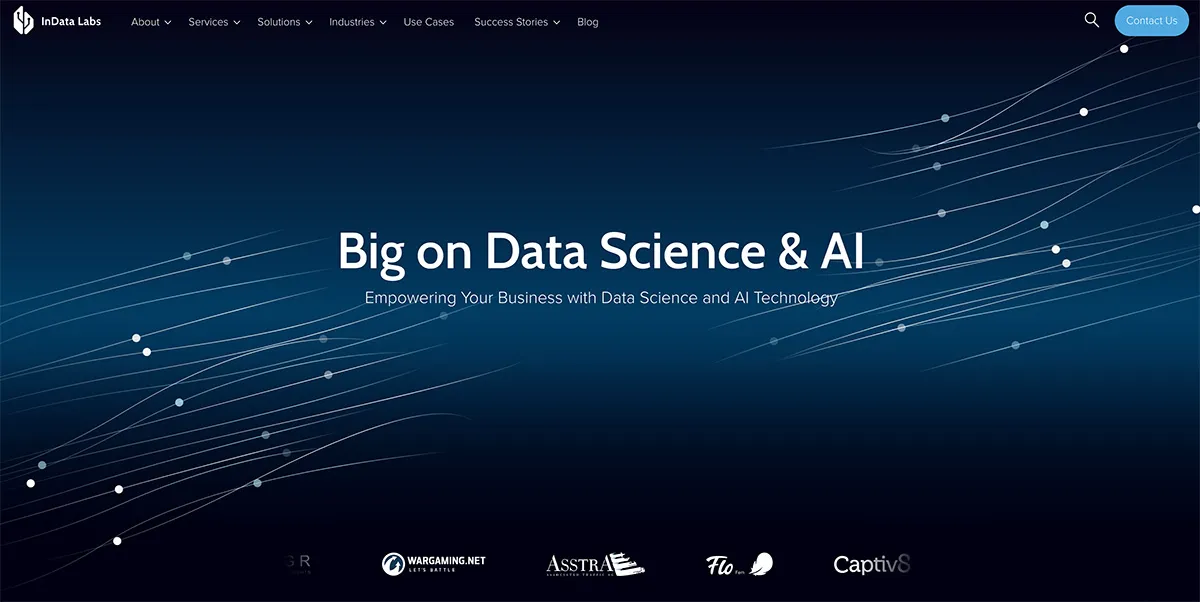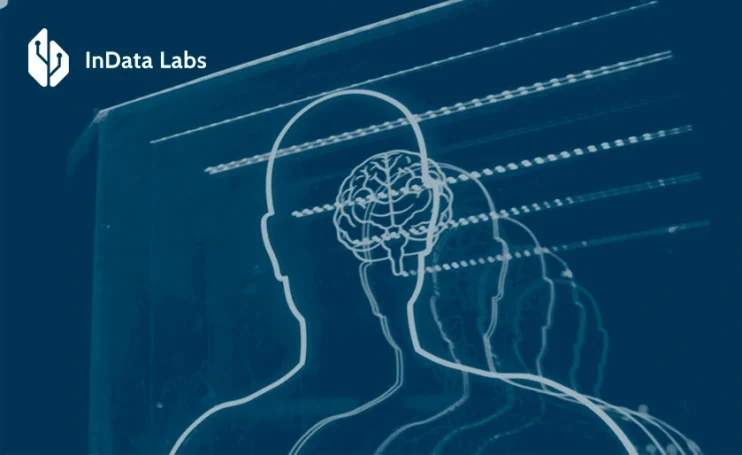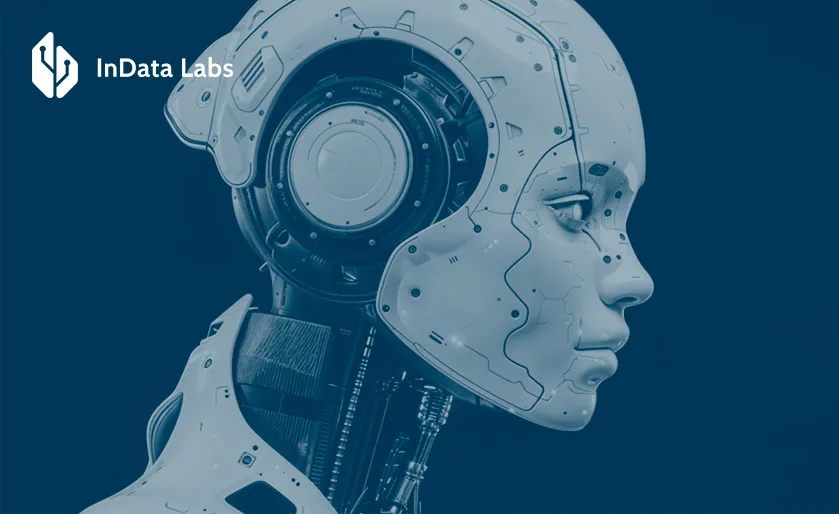Generative artificial intelligence (AI) has taken the world by storm. Despite this technology’s novelty, companies using generative AI are already seeing impressive results. These use cases range across a wide variety of industries, too.
Businesses hoping to capitalize on generative AI advantages can start by learning from real-world examples. In that spirit, here are 16 companies that use generative AI across four key sectors.

Source: Unsplash
How companies are using generative AI in finance
The finance industry has more to gain from generative AI tools than most. According to McKinsey & Company, banks that embed AI strategically (not just narrow use-cases) see significantly higher value creation. Here’s a look at some organizations leading the charge.
1.InData Labs
InData Labs is an AI and data science company helping financial and fintech organizations enhance operational efficiency, reduce risk, and unlock new revenue opportunities with data-driven solutions. Since 2014, the company has built a strong in-house R&D team and delivered 150+ projects globally. InData Labs provides end-to-end services — from AI strategy and consulting to custom model development, AI-powered platforms, Generative AI consulting, Generative AI development, data engineering, and MLOps.
The team works across banking, payments, insurance, lending, and wealth management — applying generative AI, NLP, computer vision, predictive analytics, fraud detection models, and recommendation systems to solve real industry challenges. As an AWS Certified Partner, InData Labs helps financial organizations scale AI securely and cost-effectively, enabling smarter decision-making, automation, and sustainable growth.

2. Mastercard
Mastercard is one of the many companies using generative AI for customer service. The credit card giant uses artificial intelligence chatbots to offer quick, relevant answers to user queries. That includes personalizing recommendations, providing insight into account balances, and reviewing transaction histories.
Chatbots aren’t Mastercard’s only generative AI application. It also uses the technology to prevent fraud. Generative AI-based predictive models learn what normal behavior looks like for each customer, letting them spot unusual activity.
The AI model can then stop fraudulent activity faster and more accurately than manual alternatives. Given the sensitive nature of Mastercard’s client data, it focuses on governance and responsibility in its AI applications. However, it hasn’t let that caution stop it from using this technology across its organization to drive results.

Source: Unsplash
3. Morgan Stanley
Morgan Stanley is another finance giant integrating generative AI across its operations. Unlike Mastercard, though, the company focuses less on using generative AI for the customer experience and more on improving internal processes.
Morgan Stanley began rolling out a generative AI tool to its financial advisors. These advisors, in turn, use the platform to streamline research to offer more insightful advice to their clients in less time.
The AI model can scan Morgan Stanley’s massive databases of diverse financial data to summarize key trends or pull specific insights in minimal time, boosting productivity while minimizing errors. This kind of analysis is one of the key generative AI benefits for businesses. A human could certainly do this kind of work manually — and many do — but it takes a long time, and it’s easy to make mistakes. Automating it through AI is a more reliable alternative.
4. Allstate
There are several insurance companies using generative AI, too, and Allstate is an excellent example. Given that its work relies heavily on customer service, Allstate has embraced AI chatbot development to offer better support to a wider range of users.
Allstate’s chatbot uses natural language processing (NLP) to provide real-time answers to customers about their coverage, even in different languages. The chatbot also streamlines the claims process by providing a single place to gather and review all relevant information instead of bouncing between agents and departments.
Human employees still oversee the most delicate matters — those where errors or hallucinations may introduce regulatory or financial consequences. By using AI throughout the process, though, the insurer makes it easier to fill out necessary forms in less time with fewer mistakes.
5. Goldman Sachs
On the other side of the spectrum is Goldman Sachs, which is creating multiple generative AI projects, but none are directly consumer-facing. Instead, the firm is focusing on generative AI for business intelligence and streamlining internal workflows.
Two of the Fortune 100 company’s leading AI applications are a coding tool and a documentation automation platform. The former lets employees use natural language to write code, helping overcome tech shortages while saving time. The latter ensures filing out sector-standard documents with insights from vast pools of information can remain efficient without sacrificing accuracy.
Many of Goldman Sachs’s generative AI investments remain a secret. However, it’s clear that the brand believes firmly in the future of this technology. As more generative AI applications see the light of day and these internal use cases pay off, this technology’s true potential will become increasingly clear.
6. Klarna
Not every finance company investing in generative AI technologies is an industry giant. While Swedish FinTech firm Klarna is far from a startup, it showcases the potential of generative AI for small businesses through its more straightforward adoption of this technology.
Instead of developing advanced, purpose-built artificial intelligence business solutions, Klarna encourages its workforce to use ready-made AI tools. Over 87% of its employees use tools like ChatGPT daily, mostly to analyze documents in less time or to write first drafts of contracts. While these applications may seem relatively tame, they still save workers significant time.
Klarna has developed its own AI chatbot, too, but it doesn’t see it as a replacement for off-the-shelf tools. Instead, employees use Klarna’s chatbot to get answers about internal processes while using other AI products to streamline less specialized tasks.
How software companies are using generative AI
The tech industry is another sector with much to gain from generative AI ideas for business. Software development, in particular, has seen significant strides in adoption. Here are a few of the most notable examples of enterprises using generative AI.
7. Microsoft
Microsoft was an early adopter of generative AI and capitalized on one of the most well-known applications of large language models when it integrated this technology into Bing. The generative AI-enabled search engine could answer searches in natural language and summarize multiple results for faster research.
Bing is far from the only Microsoft platform to gain generative AI functionality. The software giant also brought its AI product Copilot to its Windows 11 operating system. As a general assistant, Copilot can make it easier to adjust settings, find files or perform web searches for users who may take longer to do so manually.

Source: Unsplash
Microsoft also uses generative AI for business processes, not just consumer-facing products. Employees use it to generate initial designs for new user interfaces, predict user behavior, test software prototypes, and analyze large amounts of data. Across all these business use cases for generative AI, teams get to work faster and more accurately to keep up with evolving customer demands.
8. Adobe
Adobe is another great example of a company using generative AI in the software sector. The software-as-a-service (SaaS) business has implemented generative AI features across its Creative Cloud suite of tools, offering users new ways to use its products.
The most notable example is Adobe Firely — the company’s image-generating answer to Midjourney and DALL-E. Photoshop also now has generative AI tools that let users create images or edit pictures in less time than they could manually. Adobe Acrobat can now summarize text and answer questions about a document, thanks to NLP functionality.

Source: Unsplash
Many of these features are relatively simple compared to other business use cases for generative AI. Despite that simplicity, they make Adobe’s already successful product suite even more convenient and easy to use. As a result, generative AI has helped the organization remain competitive in an evolving industry.
9. Salesforce
The B2B software sector has also seen significant strides in generative AI for business leaders. Salesforce is one of the most prominent examples. Earlier, the cloud SaaS company introduced a generative AI product called Einstein GPT to refine customer relationship management (CRM). Einstein GPT connects companies’ data to large language models to generate content based on this information. That may look like automating email marketing campaigns, personalizing content to specific users, drafting new marketing materials, or generating code to streamline app development.
The process of large language model (LLM) development can be complex for some smaller businesses. By offering this ready-made option to connect to customers’ data, Salesforce helps its users capitalize on LLMs’ potential without that complexity. In that way, generative AI has let Salesforce improve not just its own processes but those of its customers for increased loyalty.
10. Bentley Systems
Another B2B software development use case for generative AI comes from the construction sector. Bentley Systems makes construction software for site management and architectural design. Generative AI tools have made these product offerings more enticing for its clients.
Bentley Systems uses generative AI to generate schematics to help architects design buildings in less time. Similarly, these AI tools can simulate how various changes would impact this infrastructure’s real-world performance. Construction firms can then gain confidence in their designs without extensive manual testing and redesigning.
While consumer-facing or office-related tasks are among the most popular use cases, industrial applications for generative AI can yield significant improvements, too. Bentley Systems is a prime example. Its adoption of this technology helps deliver more value to its clients, ultimately improving the safety of everyone who will live or work in the buildings they design.
How automotive companies are using generative AI
Generative AI for businesses is also making waves in the vehicle manufacturing industry. Here are some leading examples of automotive companies using generative AI.
11. Toyota
Toyota is no stranger to disruption. It led the lean manufacturing movement, and now, it’s leading the automotive industry in generative AI adoption.
Self-driving cars may be the most obvious AI application in this sector, but generative AI technologies can benefit the industry, too. Toyota uses generative models to help design new cars. The AI solution can account for factors like drag, handling, ergonomics, and safety to generate vehicle shapes and dimensions that would work well in the real world.
Toyota’s generative AI solution also supports plain text commands. That lets engineers type in requests for a certain kind of car or a specific factor to focus on to get a more relevant design suggestion in less time. Designing the next generation of safe, high-performing vehicles becomes a faster, more cost-effective process as a result.

Source: Unsplash
12. General Motors
Like Toyota, General Motors has embraced generative AI design tools. Unlike Toyota, however, it’s also brought this technology to its customer-facing processes.
GM first unveiled in-car chatbots in 2022 through its Interactive Virtual Assistant (IVA). IVA uses NLP and machine learning to assist drivers in difficult situations. The AI chatbot can inform passengers how to respond to common injuries after a crash, contact appropriate emergency services and help drivers navigate unfamiliar areas.
Beyond IVA, GM uses generative AI-powered chatbots on its website to answer questions about its products and services. This broad approach highlights how there are many ways to integrate AI for business, and embracing multiple use cases could yield the best results.
13. BMW
BMW is another great example of automotive companies using generative AI. The German automaker has developed more than 600 use cases for AI and data technologies, including some generative AI products.
As an example of generative AI for business analysts, BMW uses a generative model to analyze its enterprise data to provide insights and answer complex questions about its operations. That way, leaders can make effective strategic decisions in less time.
BMW is also implementing generative AI in its customer service workflows. Some drivers can get automatic alerts when their onboard AI recognizes the need for maintenance. In other instances, chatbots can walk potential buyers through their options and help them find a BMW that fits their needs for a smoother sales process.
How companies are using generative AI in E-commerce
Retailers represent another large portion of the companies using generative AI today. The E-commerce sector, in particular, has been bullish about this technology, as these three businesses highlight.
14. Amazon
It should be no surprise that one of the world’s leading technology companies has embraced generative AI. As both the second-largest retailer in the world and a cloud services provider, Amazon has quickly adapted to the generative AI boom to remain on top.
One of the brand’s most notable generative AI use cases is its review summaries. An AI model parses customer reviews to summarize common likes and dislikes in a single paragraph. As a result, shoppers can get an idea of people’s opinions on a product without combing through individual reviews. This improves the customer experience by providing more information upfront and helps Amazon’s business by encouraging faster sales conversions.

Source: Unsplash
Amazon also offers generative AI tools to sellers to help them craft product listings in less time. Other use cases include contactless payments, medication label-reading tools, real-time sports stats and a more conversational Alexa experience.
15. Wayfair
Furniture retailer Wayfair uses both consumer-facing and back-office generative AI tools. The former mainly involves boosting productivity by automating basic tasks, but the latter is where Wayfair’s AI adoption shines.
A tool called Decorify uses generative AI to show what a user’s home might look like in another style. Customers upload a photo of their space, letting AI generate images of real products on top of it. These AI-generated redesigns help customers see what various styles would look like in the real world before buying any furniture.
Wayfair also lets users find products by comparing images. This AI-powered feature improves the customer experience by making it easier to shop online when users don’t know how to phrase what they’re after.
16. Shopify
On the B2B side of E-commerce, Shopify offers generative AI products to online store owners. That way, small businesses can capitalize on generative AI without much experience in machine learning development, enabling faster innovation.
Personalized product recommendations are the most straightforward application for this E-commerce AI. Shopify users can also use its AI platform to generate marketing materials, emails, product descriptions, and more to keep up with E-commerce growth without repetitive manual work.
Many companies using generative AI for marketing do so through tools from other businesses. Shopify has fully leaned into that trend. By offering access to these tools, Shopify ensures the stores using its platform can stay at the forefront of technology, boosting client loyalty and retention.
Best practices for using generative AI tools for business
Now that it’s clear how companies are using generative AI, organizations should consider how to integrate these use cases into their own workflows. Doing so effectively requires attention to a few best practices.
All AI technologies rely on data, so the key to effective generative AI is providing enough accurate information. As cited by an industry article: “Between 60% and 73% of all data within an enterprise goes unused for analytics.” Consolidating data into a single source of truth in the cloud and cleansing it before analysis can help.

Source: Unsplash
Cybersecurity and data governance are crucial. Brands must ensure they restrict access to their AI training data and use real-time monitoring technologies to prevent breaches. Regulations in some jurisdictions may also limit how organizations can use some data, so consulting with legal experts and using AI partners that already comply with these standards is also important.
It’s also best to start with a small, specific use case before expanding to other applications. Businesses can work with an AI consulting service to determine the optimal place to start. These experts can also help enterprises understand how to train generative AI using your company’s data while minimizing regulatory and security risks.
Remaining concerns over generative AI for business
Despite all these generative AI benefits for businesses, some concerns remain. Most notably, some generative AI use cases introduce copyright concerns. Brands can avoid these complications by only training generative models on data they have the rights to or avoiding use cases where they’d profit directly from AI-generated content creation.
Bias is another concern, as some AI models can exaggerate and perpetuate harmful stereotypes in their data. Hallucinations are another related issue. Both of these concerns are largely a matter of more careful training. Working closely with a generative artificial intelligence development partner and paying attention to these issues in training will help companies produce a more reliable, fair AI model.
Learn from these business use cases for GenAI
While some issues remain, generative AI holds substantial promise. Once businesses learn which companies are using generative AI and how they’re capitalizing on it safely, they can make more informed decisions about the technology.
As these use cases show, it’s more than possible to use generative AI safely and effectively. Learning from real-world examples is the first step to taking advantage of this game-changing technology.



